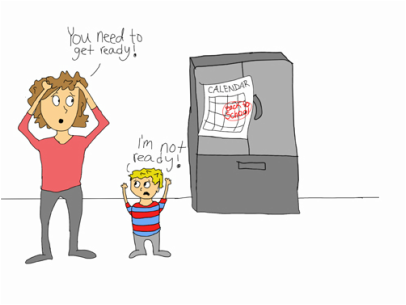|
You know it’s the end of the summer when the back-to-school ads return, everyone is buying their state fair tickets (in New York), and the leaves on the trees start changing colors, which seems to be happening earlier and earlier. The back-to-school transition brings with it a lot of emotions: excitement about entering a new grade and reuniting with friends, anxiety about joining a new classroom, meeting new classmates and teachers, concern about the difficulty of the classwork or tests, and sometimes fear of separating from parents. For kids with learning disabilities, autism spectrum disorders, anxiety, ADHD or other disabilities, these back to school transitions can be even more challenging.  According to the National Association of School Psychologists, a successful start to the school year can affect a child’s attitude, self-esteem, social interactions, and academic performance. Here are some tips on things you can do to help make the back-to-school transition a positive one for your child and family: · Attend any student orientations, back-to-school nights, or open houses offered. This gives you and your child an opportunity to become familiar with the school (if this is their first time entering the school) or teacher. If you feel that you need additional time speaking with the teacher about your child, reach out via email to schedule a longer period of time to meet. · Visit the school before the start. This will give you and your child a chance to see the layout of the school, determine where his/her classroom is, and allow your child to see what classroom he/she will be attending. If this is your child’s first time at the school, also find and point out the cafeteria, nurse’s office, and main office. Sometimes being able to put a visual with the unknown can make the process of starting school less anxiety provoking. If you would like your child to be able to meet his/her teacher before the start of the year, call the school or email the teacher to see when they will in the building before the school year starts. · Return to your school routines. Re-establish bedtime and mealtime routines, particularly breakfast, according to the school-year schedule. Do this at least one week before school begins. Explain that the reason school routines are set in place is to ensure that your child does not become overwhelmed or excessively tired by schoolwork or activities. Routines can be especially important for children with special needs, so start early. · Create a homework “nook” and backpack/lunchbox locations. Find a space in a well-lit, quiet, distraction-free environment that will be your child’s homework center. Have your child place items that he may need in that area, such as pencils, paper, markers, etc. and have him personalize it to help him feel some ownership. · Organize, organize, organize! Particularly if your child receives special education, there are lots of meetings, paperwork, and documentation to keep track of. Keep a family calendar of school events, meetings and conferences. Set up a bind or folder to keep your child’s documents, Individualized Education Program (IEPs), 504 plan, meeting notes, etc. · Review and prepare. Review your child’s IEP and make certain that you understand this important aspect of your child’s educational program. Make sure the IEP is still a good fit and that it is being implemented. Also, note when your child is up for reevaluation. · Encourage your child’s ability to cope. If your child is nervous about starting school, send notes in her lunch box or backpack in which you reinforce her ability to cope. Explain that it is normal to be nervous when you start something new and that she will be fine once she gets used to her teacher, school, and classmates. Illustrate with examples of times you have tried something new and discuss strategies that you used successfully to overcome anxiety. · Stay calm and positive. Children tend to mimic parental anxiety, so model optimism and confidence. Do not overreact if the first few days of school are challenging. Students entering kindergarten or students with disabilities, in particular, may experience separation anxiety or shyness, which will dissipate with time. Reassure your child that you love him, will think of him throughout the day, and will see her after school. · Be proactive. If possible (and you know which classmates will be in your child’s class), try to arrange playdates with peers before school starts or during the first few weeks of the school year. You do not need a birthday to organize an invitational party. If you are able to do so, sign up to volunteer in your child’s classroom. This will teach your child that school and home are related and that you care about their learning. Volunteering is also a great way to get to know your child’s teacher and other students in the class. · Reach out. If your child is still having difficulty adapting to the school routine after the first couple of weeks of school or if the transition is particularly difficult, contact your child’s teacher, school psychologist, or school counselor. Most schools have staff dedicated to students’ mental health and are happy to help. If behavior problems due to anxiety or transition difficulties persist, request a functional behavior assessment (FBA) to determine the direct cause of negative behaviors and to develop a behavior intervention plan (BIP) to get your child on the right track. Adapted from : http://www.nasponline.org/resources/home_school/b2shandout.aspx To learn more about special needs consulting and support, early literacy, and tutoring, contact Educational Solutions CNY.
2 Comments
1/27/2020 02:19:52 am
A school is a place where education is the main focus. We will discover many things as we attend the different orientations and sessions. The values and lessons that we will learn are all important and it will help us to achieve our dreams in the future. It is also a great tool for us to use. We will discover the things that define us and this is a great place to be that person that we wanted to be. A place where differences are celebrated and not a bad aspect to look at.
Reply
4/12/2023 08:07:14 pm
Empaths didn't come into this world to be casualties, we came to be heroes. Be daring. Remain solid. We really want everyone available and jumping into action.
Reply
Leave a Reply. |
Our place to post news and tips about us and our educational community. Please feel free to follow or comment.
Archives
October 2017
Categories
All
|
|
Our Team
|
Our Work
|
Our Information
e-mail us info@educationalsolutionscny.com
Call Us 315-320-6404
2070 Glenwood Dr
Cazenovia, NY 13035 |
Educational Solutions CNY is a coalition of educational consultants. Each consultant is practicing under their own license or business.
© 2021 Educational Solutions CNY. All Rights Reserved.


 RSS Feed
RSS Feed